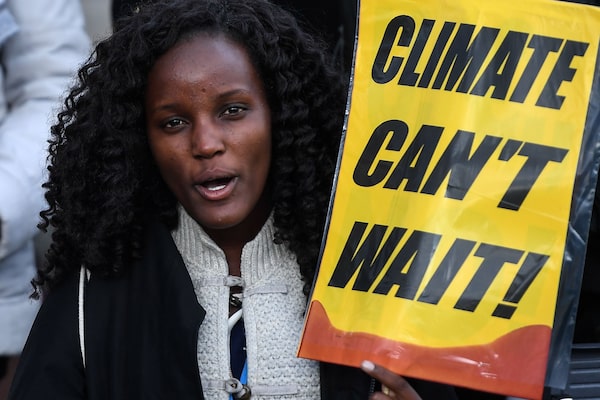
A demonstrator holds a placard reading "climate can't wait" during a protest on climate emergency, called by environmental groups including Extinction Rebellion and Fridays For Future, outside the UN Climate Change Conference COP25 at the 'IFEMA - Feria de Madrid' exhibition centre, in Madrid, on December 13, 2019.PIERRE-PHILIPPE MARCOU/AFP/Getty Images
Negotiators worked into the early hours of Sunday to try to salvage a strong global commitment to fight climate change after some of the most vulnerable nations said they were being sidelined at a marathon U.N. summit in Madrid.
Talks were scheduled to conclude on Friday but lurched into a second extra day as major economies and smaller states struggled to resolve outstanding issues under the 2015 Paris Agreement to tackle global warming.
Opinion: The climate crisis is like a world war. So let’s talk about rationing
Kevin Conrad, Papua New Guinea’s climate envoy, told delegates the talks had to be “open and transparent,” echoing concerns expressed by some other developing countries that their voices were not being heard.
“Over the last 24 hours, 90% of the participants have not been involved in this process,” Conrad said.
Carolina Schmidt, a Chilean minister presiding over the two-week annual gathering, appealed to the more than 190 countries in the Paris accord to come together to send a clear signal of support ahead of a crucial implementation phase in 2020.
“We are almost there. It’s hard, it’s difficult, but it’s worth it,” Schmidt told participants, many of whom had barely slept during the gruelling final phase.
Earlier, Chile faced fierce criticism after it drafted a version of the summit text that campaigners complained was so weak it betrayed the spirit of the Paris deal.
Supporters of strong climate action warn the Paris agreement could unravel unless countries at the Madrid summit signal they are ready to honour the deal by rapidly strengthening plans to cut greenhouse gas emissions.
Scientists warn the world will only have a chance of avoiding catastrophic warming if countries move fast to slash emissions under the Paris process, which hinges on parties ratcheting up their targets in 2020.
This summit has revealed a wide gulf between demands for action by an increasingly vociferous global climate activism movement and inertia in major economies, even as carbon dioxide emissions have hit record highs.
The talks in Madrid have become mired in disputes over potential loopholes in rules governing international carbon trading, favored by wealthier countries to reduce the cost of cutting emissions.
Carlos Fuller, chief negotiator for the Alliance of Small Island States, said the 44 low-lying nations in the bloc wanted strict rules but were being sidelined as larger countries dominated the talks.
“Are we a party to this process or not?,” Fuller asked reporters outside a meeting hall.
Schmidt said she was committed to transparency and would personally facilitate attempts to break the deadlock over carbon trading as others worked to resolve another set of disputes over financial aid for poorer countries ravaged by climate impacts.
Our Morning Update and Evening Update newsletters are written by Globe editors, giving you a concise summary of the day’s most important headlines. Sign up today.